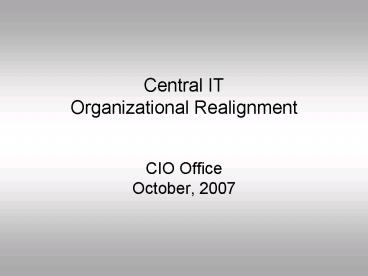Central IT Organizational Realignment - PowerPoint PPT Presentation
1 / 22
Title:
Central IT Organizational Realignment
Description:
Mission Critical 7 x 24. Exponential Growth. Succession Planning. Time marches on. Fix Current 'Problems' Eliminate Silo's - Overlaps/Duplication ... – PowerPoint PPT presentation
Number of Views:89
Avg rating:3.0/5.0
Title: Central IT Organizational Realignment
1
Central ITOrganizational Realignment
- CIO OfficeOctober, 2007
2
Current CIO Organization and Personnel
3
Drivers of Change
- Growth in IT
- Mission Critical 7 x 24
- Exponential Growth
- Succession Planning
- Time marches on
- Fix Current Problems
- Eliminate Silos - Overlaps/Duplication
- Eliminate Academic/Administrative Split
- Position for Sustainability and Growth
- Greater Policy Strategy Capacity is Needed
- Security, Ethics, Disasters, Measurement, ID
Mgmt
4
Whats Been Done to Date
- Formalize Management Structure
- Now have formal Assoc Directors in most places
- Senior Professional category available
Architects - Greater Staffing Promotional flexibility
- Pushing down personnel, budget, planning
decisions to Assoc Director level to a greater
degree - Meeting 3 4 times per year as Mgmt Group to
build team, share new ideas, concepts - Improved management capacity
- Positive Change in Many Areas
5
Bottom Line
- Not in crises situation congrats to all!
- so this is a good time to prepare for future
- Could remain as is and simply fill positions/hire
as needed - but this doesnt solve current issues
- Potential risks of changing from familiar ways
- breaking long standing paradigm
Ready for Next Step Organizational Realignment
6
CIO Reorganization Effective Immediately
7
A Closer Look
8
New Reporting Relationships
9
Reporting Relationships 2
10
What Are We Trying to Achieve
- Build Succession Capacity
- Better Planning/Coordination in Key Areas
- Network, Hardware (servers, backup, storage)
- Enhanced Policy/Strategy Capacity
- Dedicated effort in this regard
- Utilize Lionels knowledge, skills and expertise
- More Horizontal/Less Vertical
- New IT Services Delivery Model
11
IT Delivery and Support ModelComprehensive
Horizontal Groups
Users/Content Providers
P M O
Customers
University Computing Services UCS
User Support
Application
Software Developers/Integrators (ICAT, AISG)
Application Database
Database Instance
Infrastructure Services
Network Data and Voice
Network Services
No Academic/Administrative Differentiation More
Sustainable and Expandable Concentrate Expertise
12
IT Delivery and Support Model
ExternalHOSTING Model
Users/Content Providers
User Support
Customer/Vendor IT Groups
Application
Application Database
Database Instance
CIO Information Technology Group
Network Data and Voice
Other SFU Groups Can Lever On Central
Infrastructure If They So Choose
13
Architects Roles
14
Policy/Strategy/Planning(Lionels
Staff/Functional Role)
- Policy Analysis and Development
- GP24, Information Security, ID Mgmt
- Measurement and Analysis
- KPIs (Key Perf. Indicators)
- Financial Planning
- Strategic Direction
- Special Projects (e.g. Pandemic), Standards
- One IT Three Campuses - Rationalization
15
Network Services (NS)
- Data and Voice Services
- Network Security
- Computer Room Operations
- One Network multiple campuses
- Capital Renewal Projects
16
IT Infrastructure (ITI)
- Hosting Facility
- Servers, Storage, Database
- Sys Admin, Backup
- Infrastructure Planning and Management
- DR/BC
- Energy Management
- Service Provider to Other IT Groups
- CIO, SFU, External
17
University Computing Services (UCS)(Lionels
Operational Second Hat)
- Customer Facing
- Direct End User Services
- Desktop Support, MCS
- Initial Point of Contact e.g. Corp Time, BBs,
PCs - Customer Services
- Front Counter, Liaison
- Future Integrated Help Desk?
- User Compliance
- Customer Advocacy
- Research Support Enhancement
18
Institutional, Collaborative and Academic
Technologies (ICAT)
- Focus
- applications, middleware and SOA integration
techniques - software development (in-house, open-source
and/or purchased solutions) - Customers
- Students, Faculty/Academics and Support/Admin
staff (Everyone!) - Individuals, Groups and Classes
- Institutional Services
- AMAINT - computing account management
- Single signon middleware (CAS, LDAP)
- Groups and permissions middleware (LDAP groups,
maillist) - Comprehensive services e.g. eMail, Calendaring,
WebSurvey - Collaborative/Academic
- WebCT, Sakai
- Wikis, Online communities, etc.
19
Application Integration and Support (AISG)
- Integrated Applications
- ERP, Non-ERP Applications
- Development, Sustainment
- Application Services
- Crystal, Terminal Services
- Project Management Office (PMO)
- Project Management Oversight
- Business Process Review and Enhancement
- Methods, Standards and Practices
20
IT Portfolio
University ComputingServices (UCS)
Institutional Collaborative Academic Technologies
(ICAT)
Application Integration Support Group (AISG)
Network Services (NS)
IT Infrastructure (ITI)
PMO
Finance
21
Final Thoughts
- New Structure is a Beginning not Final
- Principles/Basic Organization Established
- Ongoing refinements and adjustments
- Input welcome from all
- Operational necessities come first
- Transition of responsibilities NOT Cut Run
- People may cross org boundaries
- Cant Subset Services/Responsibilities
- e.g. eMail/Calendaring, Hosting, User Support
- Full responsibility for comprehensive service -
Ownership - Doesnt necessarily mean doing everything
22
Comments, Questions, Concerns?

